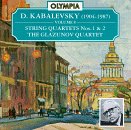| All Artists: Dmitry Kabalevsky, Glazunov Quartet, Natalia Likhopoi, Elena Kharitonova, Inna Peskova, Elena Erofeyeva Title: Kabalevsky: String Quartets Nos. 1 & 2, Vol. 8 Members Wishing: 0 Total Copies: 0 Label: Olympia Release Date: 4/26/1994 Genre: Classical Styles: Chamber Music, Historical Periods, Classical (c.1770-1830) Number of Discs: 1 SwapaCD Credits: 1 UPC: 515524002930 |
Search - Dmitry Kabalevsky, Glazunov Quartet, Natalia Likhopoi :: Kabalevsky: String Quartets Nos. 1 & 2, Vol. 8
 | Dmitry Kabalevsky, Glazunov Quartet, Natalia Likhopoi Kabalevsky: String Quartets Nos. 1 & 2, Vol. 8 Genre: Classical
|
Larger Image |
CD Details |
CD ReviewsExhilarating performances of Kabalevsky's Quartets. David A. Hollingsworth | Washington, DC USA | 06/20/1999 (5 out of 5 stars) "Dmitri Borisovich Kabalevsky (1904-1987) did not feel the urge to engage himself in writing string quartets. But during the late 1920s, his teacher Myaskovsky began to write chamber works in earnest as well as other fellow composers such as Mosolov & Shebalin. Therefore, Kabalevsky decided to embark on the genre, with his first string quartet completed by 1928. The First Quartet is youthful & fresh. The Myaskovskynian type First movement begins with a slow haunting introduction before the energetic lyricism takes over. The Petrushka-like second movement is embedded in a Russian folk song with unrestrained energy & optimism. The third movement is serene and meditative where as the Finale returns to the festivity & the exhilarance that gave the work the close of Russian pride. Although the language of Myaskovsky and even Ravel & Stravinsky are detectable in the First quartet, the piece is nevertheless a work of confidence of a composer always sure of himself. The Second String Quartet of 1945 was written in response the the Great Patriotic War (Soviet's name for World War Two). Like the 2nd & 3rd piano sonatas, the Second quartet begins with optimistic energy, as if the Soviet people engaged in their usual embarkments. Then suddenly, the mood of the music changed to signify the Nazi invasions & the effects of the invasions upno the Soviet people. Reality sets in so as to remind the people of what was really happening, and the second half of the quartet never regain the troubled optimism. The second movement begins as a serenade on the cello with a very gentle pizzicato accompaniments. The violins takes over and the rest of the movement intensifies. The Scherzo (third) movement is a relentless and fantastic whereas the fourth movement is solemn & bleak, perhaps a tribute to those who fell victim to the atrocities of the War. The finale takes over right after the fourth movement with no pause. With brief recollections on matters more serious, the final movement offers optimism, with the sense that brighter & peaceful days are forthcoming (and Kabalevsky was righ!). The Second String Quartet won the USSR State price (Category 4) and rightfully so.The "New" Glazunov Quartet performed the works with emotionalism & the sense of pride. The ensemble offered excitement & passion & there's no doubt that this is a model recording. Should I hope that Olympia keep this recording from being deleted.Recommended, with a passion."
|

 Track Listings (8) - Disc #1
Track Listings (8) - Disc #1